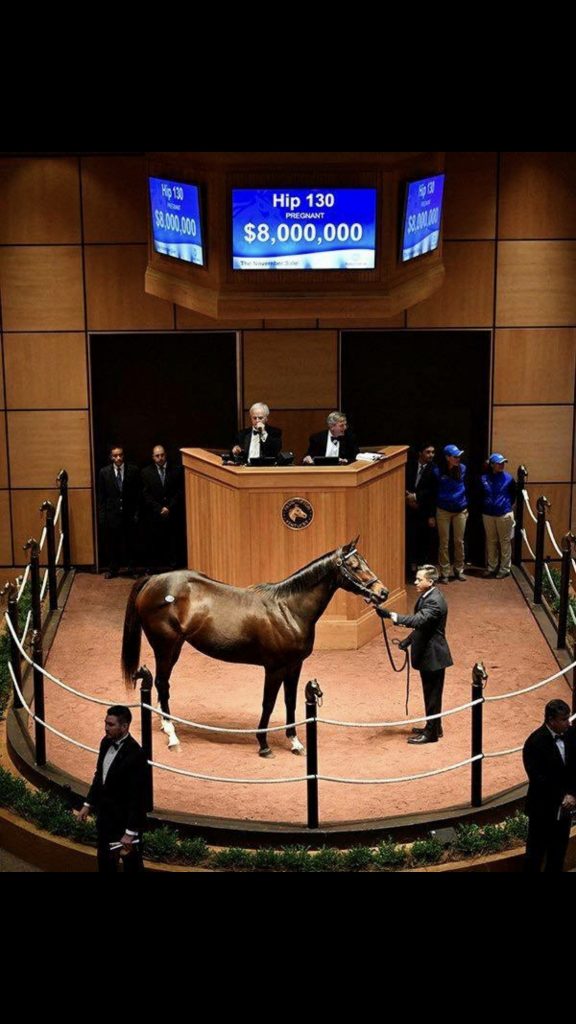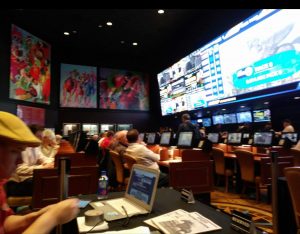
We have all heard the expression “The Greater Good” before. While you will find no formal definition of the greater good, it is generally intended to mean doing something that will not necessarily benefit you or a few, but many. Used mostly philosophically in religion and politics, the greater good can also be used to justify different acts and actions. What truly is the greater good can be a subjective matter in some cases, but in others you really have to see the whole, not just the big picture, to get it.
I think we can safely agree that most, albeit not all, people in the Sport of Kings at least have a cursory concern for the aftercare of our racehorses when their careers are finished. That logically should also extend to those bred and trained to race who never made it to the gate. Many of us have much more of a concern for Thoroughbred aftercare than that. There are people and rescue groups who work tirelessly, often at their own expense and time, and many times without thanks or notice to try and save our beloved equine athletes from the cruel fate that can await some of them. These people and groups have divided themselves into two camps, and often battle with each other over who is right and truly doing the greater good.
The Sport of Kings is marred by many issues today including corruption, drugs, and what we do with our horses when they are finished running for us. Make no mistake, while these animals are bred and love to run, when they race competitively they are doing it for us. If you don’t see that you are fooling yourself.
Why Thoroughbred Aftercare is Needed
Exceller, who was bred by the wealthy Nelson Bunker Hunt, and held the rare distinction of beating not one but two Triple Crown winners in the same race (Seattle Slew and Affirmed), died in a slaughterhouse. Ferdinand, who was born at legendary Claiborne Farm, trained by Charlie Whittingham, won the Kentucky Derby and was Horse of the Year, died in a slaughterhouse. Racehorses being slaughtered when they cannot race anymore is nothing new to our sport. It obviously happens at the highest levels of the game, which tells us how much worse it is with less expensive claiming horses on smaller circuits who run just as hard when they are loaded in the gate for all of us.
The two groups of people and organizations who rescue horses from what is referred to as kill pens are in a bitter dispute, each thinking they are doing the greater good. In reality only one is. To understand that you will have to look at this a little personally. We all know and love the phrase coined in the classic film The Godfather, it’s not personal, it’s strictly business. If you have ever been on the wrong end of a gun you know that is not always true, when you or a loved one is being killed it doesn’t get more personal regardless of how romantic a movie phrase makes it sound.
The dispute is over whether or not horses marked for slaughter, ex racehorses specifically, but it can and at times does apply to other horses, should be saved by being pulled from certain kill pens who try and capitalize on the humanitarian effort to save them by charging a sur-charge or ransom. Sometimes those charges escalate when the operators of these pens learn there is interest in a specific horse or group of horses. On one side we have rescuers who believe paying these ransom fees only encourages these kill pen operators to continue the practice, and that refusing to pay it and letting these horses meet the same fate as Exceller and Ferdinand is for the greater good. On the other hand we have rescuers who believe in not leaving any fallen soldier behind, and pay the ransoms and save those horses from a most unpleasant end.
This is a more complicated issue than it appears on the surface, but if broken down logically, and personally, it becomes clear. The rescuers who would chose to let a horse die to make a point of not paying a ransom need to ask themselves this; if our efforts closed this kill pen down, would another just like it open up? The answer is likely yes. If our industry made a concentrated effort to boycott a pen, the most likely outcome would be all horses that wind up in that pen go to slaughter, but if it did somehow shut down another would pop up faster than they run the Kentucky Derby. Letting horses die is not the answer to the problem. Saving every single one we can while not the answer is indeed part of the solution wherein letting them die to prove a point is more part of the problem. Nobody gets to play God, that is for Him alone, you are either committed to saving lives or you aren’t. You don’t get to say leave no man behind when you run from the battlefield leaving a comrade saying I never really liked what he stood for anyway. This is not politics where you implement a policy not to negotiate with terrorists. This is not government, this is doing what is best for the horse, the sport, and yourself.
Granted the rescuers who won’t pull a horse from a kill pen do have a point, they just don’t have an answer which is what our industry needs. No one condones or approves of the ransom concept. Most I would venture find it despicable, but until we find a way to drive them out of business or at least our sport, allowing them to kill our horses is not the answer. We have a lot of Thoroughbred aftercare farms and homes for retired thoroughbreds, we have some loose guidelines and restrictions towards owners that are way to easy to skirt, but we don’t have proper accountability and funding to implement and enforce a zero tolerance policy towards racehorses ending up in kill pens and slaughterhouses. Unfortunately that is exactly what we need.
All rescuers, regardless of which side of that argument they land on, would be better served working together instead of waging war on social media. Until our sport has a central governing body this problem will continue to exist. Divided we can barely make a small dent, united perhaps a bigger dent, but we need to all fall under one umbrella and create an atmosphere that does not allow, condone, or promote racehorse slaughter.
Think about the staggering amounts of money spent at auctions on a whim and a dream along with the money put through the windows and ADW’s across the country. You are dealing with the wealthiest and most fortunate financial people in the country and sometimes world. Do we think that a siphon off the top would hurt any of them when they buy a Green Monkey? Almost everyone who plays this game at any level has a passion for it, do you think making Thoroughbred aftercare a visible and forefront priority will drive them away? Let us remember we are the Sport of Kings, can we not conquer a problem that has gotten to the point where trucks going to kill pens are parked on the backside, and owners are altering tattoos so there former horses aren’t identified? Can we not regulate the sale and retirement of a living animal as diligently as the Department of Motor Vehicles regulates the sale of a junked car? In the 70’s and 80’s you could get a car with a salvage title on the road, try it today. The Department of Motor Vehicles regulates that better than the Sport of Kings protects their own. Why, centralized leadership, which our industry needs but lacks.
Maybe the greater good is about making a difference. I remember as a small boy my Dad told me a story I never forgot. It was about an old man walking along the beach after a storm. The beach was filled with starfish that had been washed up. In the distance he saw a small boy picking things up and throwing them back into the water. As they got closer the old man called to the boy and asked what he was doing. The boy replied he was picking up starfish and throwing them back into the ocean. The old man answered saying there must be tens of thousands of starfish on this beach, you will hardly be able to make a difference. The boy bent down, picked up another starfish and threw it as far into the ocean as he could. Then he smiled at the old man and said it made a difference to that one.
If you really want to know if pulling a horse from a ransom kill pen is the right thing and greater good, it is pretty simple. Just look into the eyes of the horse being loaded on the van for slaughter after being abandoned by their owner, and again by a rescuer trying to tell them it was for the greater good.
With a governing body we can change things, and only then can we restore our game to the glory days of the past. Until we get one SUPPORT RESCUE any way that you can. If you can’t donate, share for awareness. The multiple jurisdictions and leadership we have now makes baby step progress, then takes four steps back. While this happens, racehorses are carted away to slaughter, bettors get hosed, attendance dwindles, and Nero fiddles. If the slaughter of our horses can’t unite us, what can? With a leadership group and full cooperation, we can address these issues and more but staying on point we could set up a designated retirement process funded by the owners with additional financial aid from all sales, racetracks, purses, and wagers to implement a safe retirement and home for our game’s competitors. The farms are out there, the people who care are out there, the money could be there, the unity and leadership isn’t. That’s what we need and that is for the greater good.
 HIGH FIVE : This week’s HIGH FIVE goes to 2017 NHC winner Chris Littlemore. Chris reportedly used the Daily Racing Form, and a pen. It was probably DRF FORMULATOR. Congratulations to an old school winner!
HIGH FIVE : This week’s HIGH FIVE goes to 2017 NHC winner Chris Littlemore. Chris reportedly used the Daily Racing Form, and a pen. It was probably DRF FORMULATOR. Congratulations to an old school winner!
LOW FIVE: I love jackpot wagers and any chance at the races for a big score, and I am not going to call out any specific announcers and analysts, you know who you are and I know who you are, but stop with the for 50 cents you can win 500k, or for 20 cents you can win $2 million. It’s misleading and insulting to regular players. Yes technically it can happen but how many single tickets for the whole Rainbow 6 🌈 pool cost only 20 cents? How many times did someone take down a guaranteed one million dollar Pick 4 with a sole 50 cent play. It hurts my ears when you say it like that. All you need is 20 cents for $2 million. Seriously. I love you promoting the game we love but can we at least pretend some of who are listening actually know what is going on?



